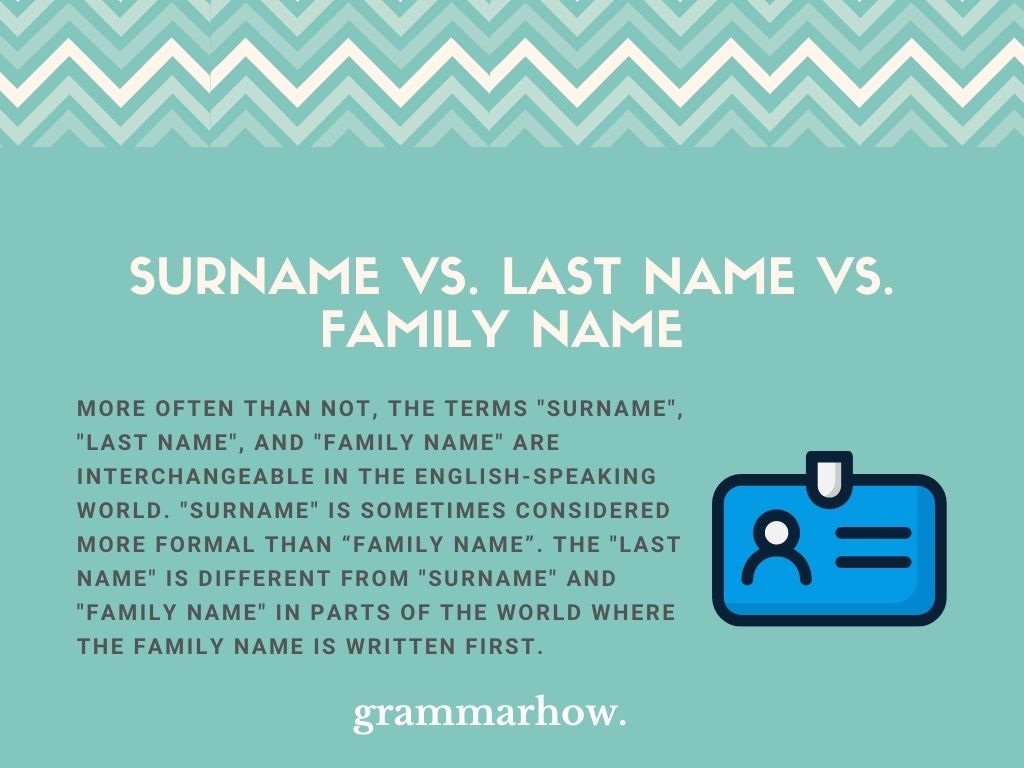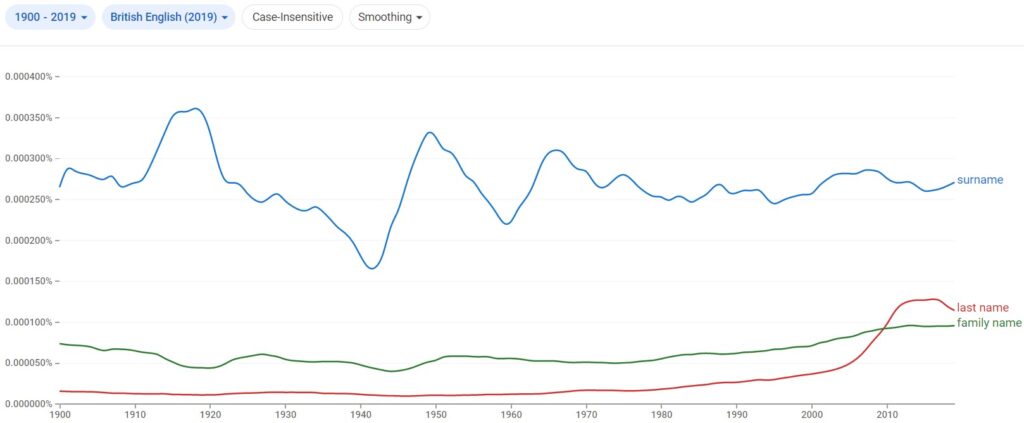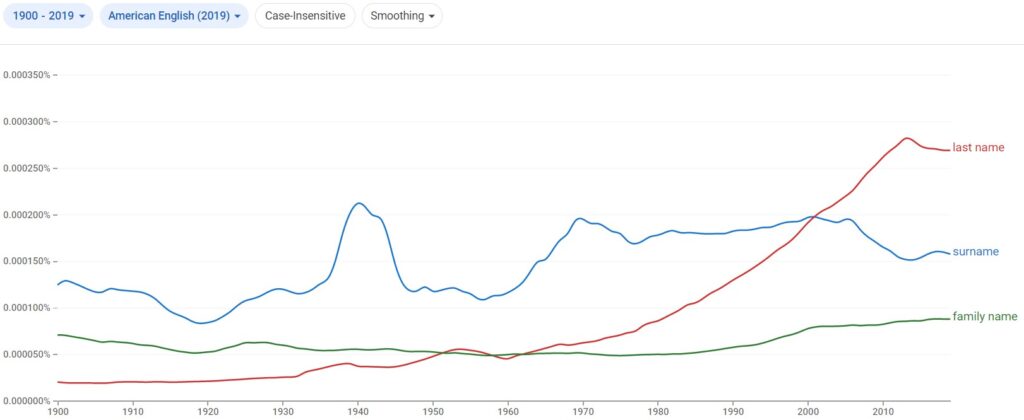The terms “surname”, “last name”, and “family name” are often used interchangeably. In this article, we will explore whether these terms all mean the same thing, or if there are subtle differences among the three.
Surname vs. Last Name vs. Family Name
More often than not, the terms “surname”, “last name”, and “family name” are interchangeable in the English-speaking world. “Surname” is sometimes considered more formal than “family name”. The “last name” is different from “surname” and “family name” in parts of the world where the family name is written first.

In the English-speaking world, the terms “surname”, “last name”, and “family name” are usually interchangeable.
Between “surname” and “family name”, the only difference nowadays seems to be that “surname” is more often used in formal documents, while “family name” is a less formal term.
It is, however, possible for the two to be different in rare cases, such as:
- Leonardo da Vinci
Here, “da Vinci” is not Leonardo’s family name, but it is his surname. His surname shows where he’s from, as “da Vinci” means “from Vinci”. These cases were more common in the past.
In other parts of the world, however, the last name may be different from the surname and family name. For example, in countries that speak Chinese, the surname or the family name is usually written first. In these cases, using the term “last name” could cause confusion. Thus, it is better to avoid it and use either “surname” or “family name” in these situations.
Surname
The term “surname” refers to the name a person shares with other members of his or her family, tribe, or community.
A surname is what identifies an individual as a member of a family, tribe, or community. It is usually synonymous with the term “family name”, however, it is possible for the two to be different.
Where the surname is located differs from culture to culture. There are even some cultures that do not make use of surnames.
In many places, including English-speaking cultures, names are written as follows: [first name/given name] + [surname/family name]. In these cases, surnames are also last names.
Below, in bold, are examples of surnames that are also last names:
- John Doe
- John F. Kennedy
- Clark Joseph Kent
- Juan de la Cruz
- Linda Flynn-Fletcher
There are also many places in which surnames are not written after the first name. They are written as follows: [surname/family name] + [given name].
Below, in bold, are examples of surnames that are not last names:
- Kim Yuna
- Hua Mulan
- Lim Eunsoo
Last Name
The term “last name” refers to the name that is written at the end of one’s name.
The “last name” is what identifies an individual as a member of a family, tribe, or community in places where names are written as follows: [first name/given name] + [last name]. In the English-speaking world, the term “last name” is synonymous with the terms “surname” and “family name”.
Below, in bold, are examples of what a “last name” is:
- Joe Bloggs
- Harry James Potter
- Lily Evans
- Bruce Wayne
- Anthony Stark
Family Name
The term “family name” refers to the name that identifies a person as a member of a particular family.
The “family name” is what identifies a person as a member of a particular family. It can be interchangeable with the terms “surname” and “last name”, but only to the extent that these identify a person as a member of a family.
Examples of what a “family name” is can be seen below, in bold:
- Gomez Addams
- Morticia Addams
- Wednesday Addams
- Pugsley Addams
Here, it can be assumed that all of these people are members of the Addams family.
Surname vs. Last Name vs. Family Name – UK Statistics
In the United Kingdom, data shows that “surname” is the most popularly used among “surname”, “last name”, and “family name”.
Google Ngram Viewer charts how often certain words are used in a wide range of books. According to data from books that use British English that were published between the years 1900-2019, the term “surname” is the most popular among the three. It has also remained the most popular since the year 1900, by a wide margin.

Up until about 2010, “family name” was the second most popular term. However, it has since been surpassed by “last name”.
Surname vs. Last Name vs. Family Name – US Statistics
In the United States, “last name” is currently the most popularly used among “surname”, “last name”, and “family name”.
Using Google Ngram Viewer, we can chart how often each of these terms is used in books written in American English that were published between the years 1900-2019. According to data from these books, the term “last name” is currently the most popular among the three.

However, this is only a recent development. “Surname” was formerly the most popular among the three, from 1900 up until the year 2000.
Interestingly. the term “family name” (now the least popular among the three) was once more popular than “last name”, between the years 1900-1950.
Is “Surname” and “Last Name” The Same In Passports?
If your passport was issued in a country where the surname is also the last name, then this would reflect on your passport. The same is true if your passport was issued in a country where the surname is placed before the given name.
Whether the terms “surname” and “last name” are interchangeable in passports depends on where the passport was issued.
Passports issued in countries such as the United States, where a person’s surname is the same as his or her last name, treat the terms “surname” and “last name” as interchangeable. This may not be true in places such as China, where the surname is placed before the given name.
Is “Surname” and “Father Name” The Same?
They are sometimes the same, depending on one’s culture. While there are instances where the surname is the same as the father’s name or last name, there are also instances where the surname is not the same as either the father’s name or last name.
In countries such as the United States or the United Kingdom, one’s surname is usually the father’s last
name. There are some exceptions to this, however, such as when one’s father and mother are not married. In these cases, the surname is the same as the mother’s last name.
In some areas that do not use surnames in the Western sense of the word, they sometimes use the name of one’s village and the father’s first name as the surname.

Martin holds a Master’s degree in Finance and International Business. He has six years of experience in professional communication with clients, executives, and colleagues. Furthermore, he has teaching experience from Aarhus University. Martin has been featured as an expert in communication and teaching on Forbes and Shopify. Read more about Martin here.
